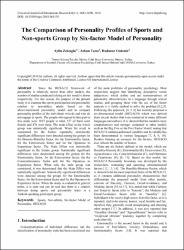| dc.contributor.author | Zekioğlu, Aylin | |
| dc.contributor.author | Tatar, Arkun | |
| dc.contributor.author | Özdemir, Hüdanur | |
| dc.date.accessioned | 2021-07-29T09:06:45Z | |
| dc.date.available | 2021-07-29T09:06:45Z | |
| dc.date.issued | 2018 | en_US |
| dc.identifier.citation | ZEKİOĞLU, Aylin, Arkun TATAR & Hüdanur ÖZDEMİR. "The Comparison of Personality Profiles of Sports and Non-Sports Group by Six-Factor Model of Personality". Universal Journal of Educational Research, 6.11 (2018): 2683-2690. | en_US |
| dc.identifier.uri | https://files.eric.ed.gov/fulltext/EJ1195775.pdf | |
| dc.identifier.uri | https://hdl.handle.net/11352/3786 | |
| dc.description.abstract | Since the HEXACO framework of personality is relatively newer than other models, the number of studies conducted relying on this model is fewer respectively. For this reason, the purpose of the present study is to examine the sports participation and personality relation in non-athlete adults based on the above-mentioned personality model and to compare personality profiles of the individuals who do and who do not engage in sports. The people who agreed to take part in this study were 1013 people in total, 537 of them were female and 476 were male. The main effect in the whole group was statistically significant. When the result is considered for the factors separately, statistically significant differences were detected among the groups for the Honesty-Humility factor, for the Emotionality factor, for the Extraversion factor and for the Openness to Experience factor. The Main Effect was statistically significant in the female group. Statistically significant differences were determined among the groups for the Emotionality factor, for the Extraversion factor, for the Conscientiousness factor and for the Openness to Experience factor. When only the male group was considered, it was determined that the Main Effect was statistically significant. Statistically significant differences were detected among the groups for the Emotionality factor, for the Extraversion factor and for the Openness to Experience factor. When the study is evaluated in general terms, it is seen and can be said that there is a relation between doing sports and personality traits in a Turkish-speaking participant group. | en_US |
| dc.language.iso | eng | en_US |
| dc.publisher | Horizon Research Publishing | en_US |
| dc.relation.isversionof | 10.13189/ujer.2018.061135 | en_US |
| dc.rights | info:eu-repo/semantics/openAccess | en_US |
| dc.subject | Sports | en_US |
| dc.subject | Non-Athlete | en_US |
| dc.subject | Six-Factor Model of Personality | en_US |
| dc.subject | HEXACO | en_US |
| dc.title | The Comparison of Personality Profiles of Sports and Non-Sports Group by Six-Factor Model of Personality | en_US |
| dc.type | article | en_US |
| dc.relation.journal | Universal Journal of Educational Research | en_US |
| dc.contributor.department | FSM Vakıf Üniversitesi, Edebiyat Fakültesi, Psikoloji Bölümü | en_US |
| dc.identifier.volume | 6 | en_US |
| dc.identifier.issue | 11 | en_US |
| dc.identifier.startpage | 2683 | en_US |
| dc.identifier.endpage | 2690 | en_US |
| dc.relation.publicationcategory | Makale - Uluslararası Hakemli Dergi - Kurum Öğretim Elemanı | en_US |
| dc.contributor.institutionauthor | Tatar, Arkun | |
| dc.contributor.institutionauthor | Özdemir, Hüdanur | |



















